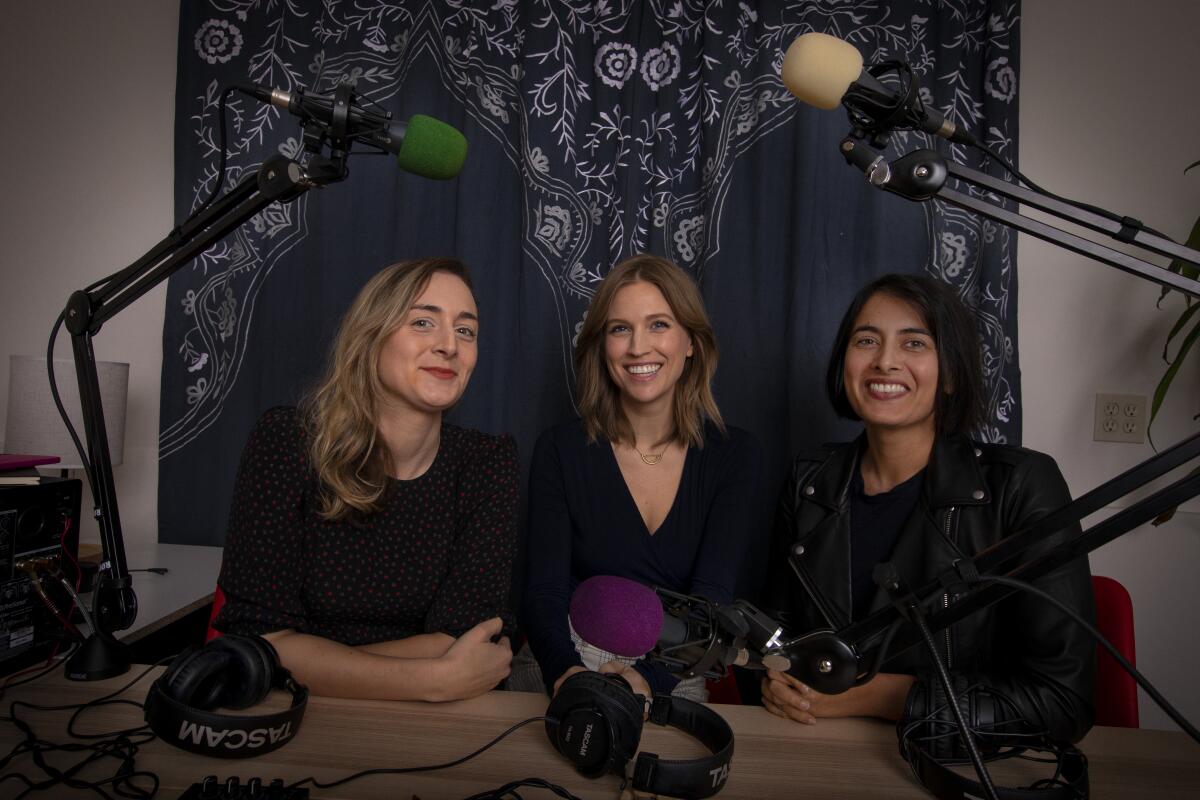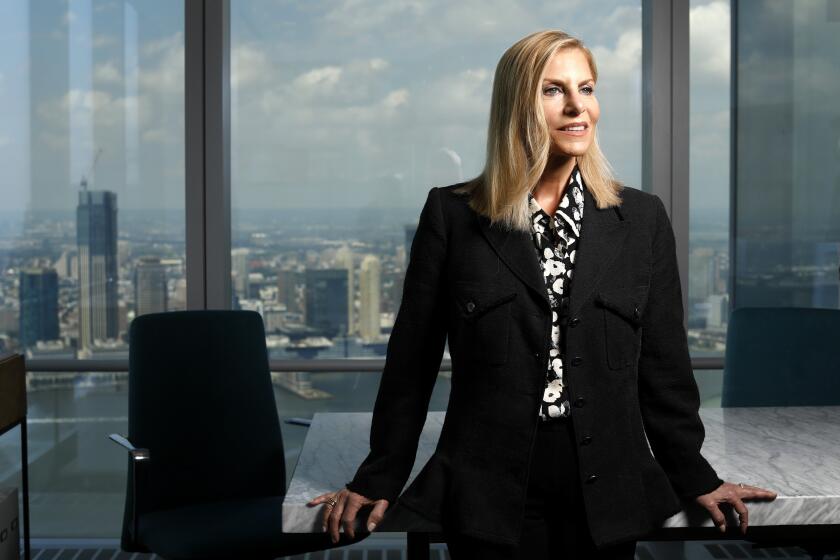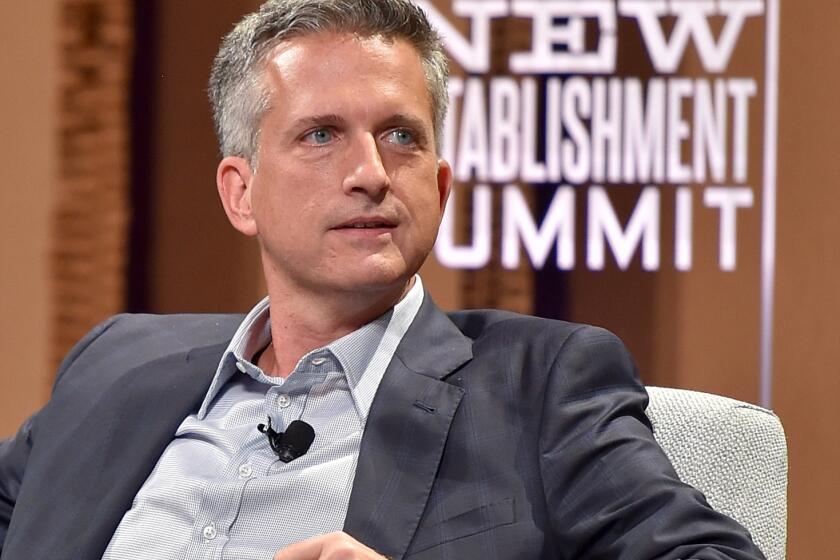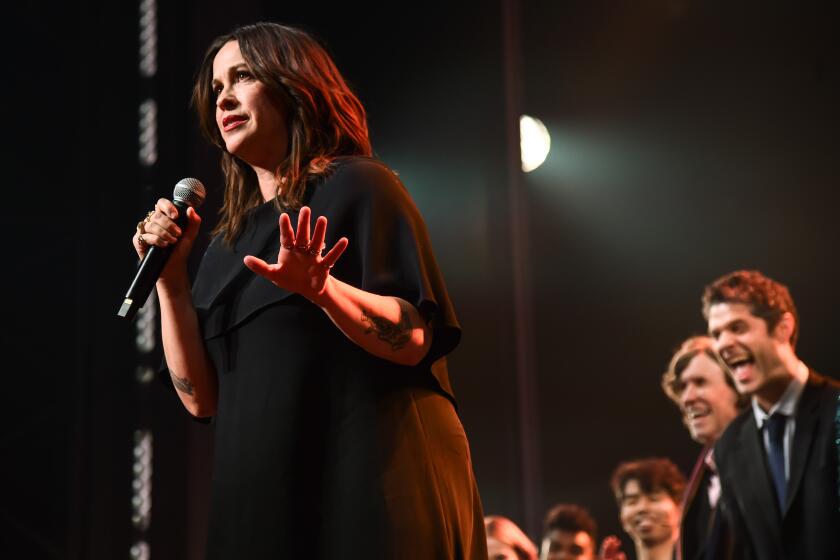Why women are starting their own podcasting networks

- Share via
Amanda Lund and Maria Blasucci, two comedian-actors who have been podcasting for more than 10 years, were sick of bringing fully formed ideas to the male gatekeepers at podcasting networks and being told “no.”
So seven months ago, they started Earios, a network of comically bent shows “by women, for everyone” — a launch process that was “very rage-driven,” Lund said with a laugh. She and Blasucci host a show called “The Big Ones,” in which they hash out moral conundrums. A recent episode explored the Varsity Blues college admissions scandal.
“We had done a pilot, and it was exactly what it is today — it didn’t need much explanation,” Blasucci said. “And we were being met with, like, ‘No, let’s workshop it.’ And we just didn’t want to do it. And because I went to an all-girls school, and everything I start is all-women — I started an all-women’s improv team, an all-women’s basketball league — it was like: ‘I can’t think of any all-women’s podcast networks. Let’s do that.’”
Anyone can make a podcast, but not everyone can be heard, and even fewer make money. That’s where networks come in.
Dawn Ostroff, Spotify’s chief content officer, says she plans on making hundreds of original podcast series next year as part of a strategy to expand the streaming platform’s podcast offerings. The company aims to have 20% of the listening on its service be non-music.
Lund and Blasucci founded Earios with Priyanka Mattoo, a former producing partner of Jack Black. A major catalyst for the female-run network with all female show hosts — including Margaret Cho, Molly Hawkey and Mattoo — was the lack of gender equity in podcasting. According to their research, only 22% of podcasts are hosted exclusively by women, and only 11% more are cohosted by women.
They raised $26,000 in seed money on Kickstarter to cover startup costs such as web and graphic design, theme music, recording equipment, legal fees, bookkeeping and production on an inventory of episodes before launch. Mattoo said in an email that they got a “shocking” amount out of the initial investment.
With 12 shows produced by the launch date, that translated to about $2,000 per show for the year. “Honestly, that’s all thanks to Maria and Amanda working entirely for free (and for the love of the game),” Mattoo said.
The Writers Guild of America East and other Hollywood unions are expanding their presence in podcasting, which is growing rapidly in L.A. It’s part of a wave of digital media organizing in recent years.
Asking for money — and for ratings, reviews and subscriptions — is the requisite fuel for podcast success. Revenue comes from ad sales, which are based on the number of listens. The Earios founders say this is where women are often at a disadvantage.
“We would always do our ‘asks’ at the very end, very meekly — like apologetically,” Lund said. One of the incentives for Kickstarter donors was a five-minute phone call with the duo, and through that they spoke with a woman who works on the business side of podcasts. She cited studies showing that women do their asks at the end and men do theirs at the beginning — and men are much more successful.
“Maria and I just ran with that idea, and we started doing these really aggressive asks on ‘The Big Ones,’ where we go: ‘You will donate to our Patreon,’” Lund said, referring to the platform they use to collect subscription revenue. “You will rate and review us. Otherwise, this premium content will cease to exist.”
Other women have been pushing ahead with networks too. One of podcasting’s biggest hits is “My Favorite Murder,” in which hosts Karen Kilgariff and Georgia Hardstark bring a funny, feminist spin to their widespread obsession with true crime. They started the network Exactly Right in 2018.
“There now are so many podcasts that it feels like you do need to be connected to other people and bigger shows to basically get the exposure,” Kilgariff said.
“Also, being on a network kind of legitimizes the new podcast that you’re putting out,” added Hardstark. “‘My Favorite Murder’ listeners know that Karen and I are not going to give you trash. They respect our opinion, and if we suggest something, they’ll listen to it, knowing that we’re not going to steer them wrong.”
Exactly Right also hosts the true crime show “Jensen & Holes: The Murder Squad” and the feline-focused “The Purrrcast.”
Kilgariff posited that as hosts, dudes (particularly comedians) seem more comfortable just grabbing a microphone and assuming that people want to listen. On the business side, Kilgariff and Hardstark said, nine out of 10 “suits” they meet with in podcasting are men, which has required building new muscles.
“If somebody talks over you, the thing I learned [is] you just keep talking and keep maintaining eye contact,” Kilgariff said. “Then the person who thinks they can talk over you suddenly learns: They can’t. Many of us were raised with the ‘be a lady’ thing, and all those kind of things that can be used against you and strip you out of opportunity and power.
“The more women that are in these positions, the more young women can learn that these are things they can do.”
“Jagged Little Pill” is a bold musical for #MeToo times. Says Morissette: “I’ve had this experience ... and I’m not afraid of talking about it.”
Jessica Cordova Kramer and Stephanie Wittels-Wachs started the network Lemonada after their younger brothers died of drug overdoses. Their flagship show is “Last Day,” a scripted, first-person narrative hosted by Wittels-Wachs, whose late brother was “Parks and Recreation” writer-actor Harris Wittels. It’s a deeply personal look at the opioid crisis through the prism of a victim’s last day.
Lemonada, which also hosts an “empathy-building” show with Sinéad Burke and the parenting podcast “Good Kids,” was self-funded by Wittels-Wachs and Kramer. They listed all the expenses that come with such an operation: a large freelance team of producers, editors, social media and support; four full-time staff; a PR firm; marketing and branding support; accountants; attorneys; and a sizable digital and podcast ad budget to build audience.
At their launch party at Largo at the Coronet in September, the Lemonada founders were humorously brazen about asking for subscriptions.
“When our brothers died, we were like: There’s no ... point in anything, so let’s just do it,” Kramer said.
“It is empowering to have your world shaken, in a way,” Wittels-Wachs said. “Like, when your favorite person in the world drops dead, you do truly realize in that moment, ‘We are all gonna die. What the ... are we waiting for? Like, what’s at stake?’”
Added Kramer: “And if we want people to not die of opioid overdoses anymore, we need federal policymakers and state policymakers and city police to listen to our shows. So I really want people to not just download and subscribe because it’ll make us money if they do. I want people to hear our [stuff] because we think it’s actually gonna make their lives better.”
More to Read
The biggest entertainment stories
Get our big stories about Hollywood, film, television, music, arts, culture and more right in your inbox as soon as they publish.
You may occasionally receive promotional content from the Los Angeles Times.













